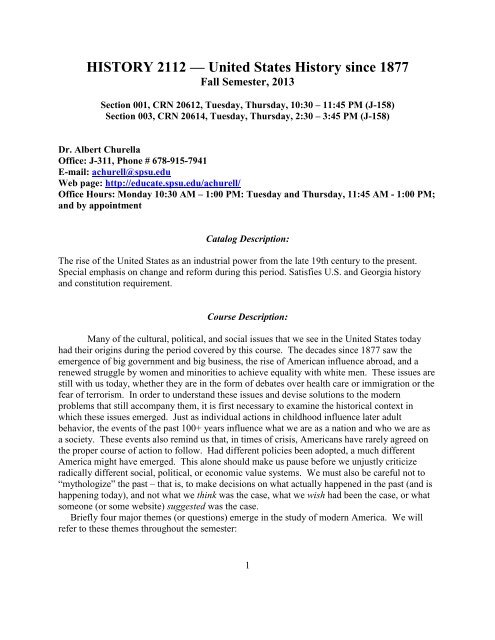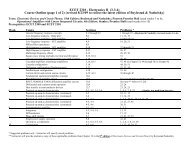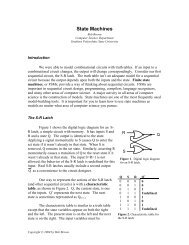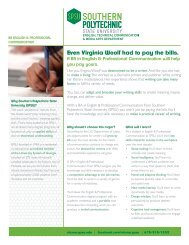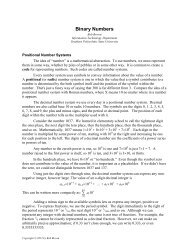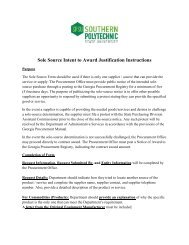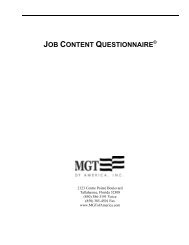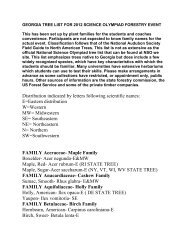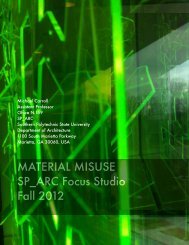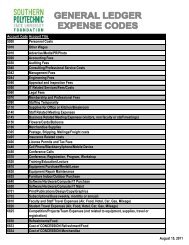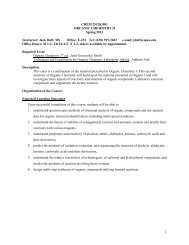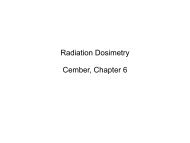HIST 2112 -- United States History since 1877
HIST 2112 -- United States History since 1877
HIST 2112 -- United States History since 1877
- No tags were found...
Create successful ePaper yourself
Turn your PDF publications into a flip-book with our unique Google optimized e-Paper software.
<strong>HIST</strong>ORY <strong>2112</strong> — <strong>United</strong> <strong>States</strong> <strong>History</strong> <strong>since</strong> <strong>1877</strong>Fall Semester, 2013Section 001, CRN 20612, Tuesday, Thursday, 10:30 – 11:45 PM (J-158)Section 003, CRN 20614, Tuesday, Thursday, 2:30 – 3:45 PM (J-158)Dr. Albert ChurellaOffice: J-311, Phone # 678-915-7941E-mail: achurell@spsu.eduWeb page: http://educate.spsu.edu/achurell/Office Hours: Monday 10:30 AM – 1:00 PM: Tuesday and Thursday, 11:45 AM - 1:00 PM;and by appointmentCatalog Description:The rise of the <strong>United</strong> <strong>States</strong> as an industrial power from the late 19th century to the present.Special emphasis on change and reform during this period. Satisfies U.S. and Georgia historyand constitution requirement.Course Description:Many of the cultural, political, and social issues that we see in the <strong>United</strong> <strong>States</strong> todayhad their origins during the period covered by this course. The decades <strong>since</strong> <strong>1877</strong> saw theemergence of big government and big business, the rise of American influence abroad, and arenewed struggle by women and minorities to achieve equality with white men. These issues arestill with us today, whether they are in the form of debates over health care or immigration or thefear of terrorism. In order to understand these issues and devise solutions to the modernproblems that still accompany them, it is first necessary to examine the historical context inwhich these issues emerged. Just as individual actions in childhood influence later adultbehavior, the events of the past 100+ years influence what we are as a nation and who we are asa society. These events also remind us that, in times of crisis, Americans have rarely agreed onthe proper course of action to follow. Had different policies been adopted, a much differentAmerica might have emerged. This alone should make us pause before we unjustly criticizeradically different social, political, or economic value systems. We must also be careful not to“mythologize” the past – that is, to make decisions on what actually happened in the past (and ishappening today), and not what we think was the case, what we wish had been the case, or whatsomeone (or some website) suggested was the case.Briefly four major themes (or questions) emerge in the study of modern America. We willrefer to these themes throughout the semester:1
First, how did the <strong>United</strong> <strong>States</strong> become the world’s great economic superpower, andhow has this status affected the lives of ordinary Americans? How well has industrialization andthe rise of big business meshed with such cherished elements of American mythology as theclassless society and a purely capitalistic market-driven economy? How have Americansattempted to reconcile the seeming disconnect between our political philosophy of democracyand our economic philosophy of capitalism?Second, how did the <strong>United</strong> <strong>States</strong> become such a diverse and inclusive society, inmatters of race, ethnicity, gender, class, and religion?Third, how did government, and especially the federal government become so importantin our lives? Why, at a time when we are more reliant on government than ever before in ournation’s history, do so many Americans agree with the statement of former President RonaldReagan that “Government is not a solution to our problem, government is the problem.”?Fourth, how did the <strong>United</strong> <strong>States</strong> become the world’s great military superpower, withan aggressive, activist foreign policy agenda? How have American ideals and values contributedto this nation’s participation in wars ranging from World War I to Vietnam to Iraq?Learning Outcomes:After satisfactorily completing this course, students will be able to:1. Identify historical issues in and cite knowledge of the American past.2. Reach informed conclusions about historical sources and develop multiple explanations forhistorical events.3. Describe the ways in which the past affects current events.4. Identify the cultural values of the U.S. and the role of minority views in reshaping thosevalues.Readings:The following book is available at the SPSU campus bookstore. You are expected tohave read (and, if necessary, reread) assigned materials prior to the class meeting for whichthose readings were assigned.Retrieving the American Past (a.k.a., RTAP) – This is NOT a textbook – Because this isa customized reader, do not purchase a version at any other bookstore, or from a previous2
semester – this is probably also a book that you should buy directly from the SPSUbookstore, as they are the only ones with new, unmarked, current copies of RTAPTextbook (there isn’t one), BUT – a textbook serves three functions. First, and mostimportantly, you will need to read ahead, so that you will be familiar with basic information on aparticular topic BEFORE we discuss it in class. There are no specific chapter assignments, butyou can read ahead in the text simply by charting our progress in the class relative to the courseoutlines. Obviously, the less familiarity you have with U.S. history, the more thoroughly youwill have to read the text. Second, the text will enable you to fill in things that you might havemissed in class, particularly if you are absent on a particular day. Third, the text will provide analternate perspective and interpretation to the material presented in lecture. Any good quality,college-level Modern U.S. <strong>History</strong> survey text is acceptable. Two good possibilities are EricFoner, Give Me Liberty!: An American <strong>History</strong>, Second Seagull Edition, Volume 2, W. W.Norton & Company, ISBN 978-0-393-93256-0, and Pauline Maier, et al., Inventing America, 2 ndEdition, Volume Two. W. W. Norton & Company, ISBN 978-0-393-16816-7.Class Policies:Please refrain from private conversations in class—if you have a question, ask the instructor,not your neighbor.Turn off all cell phones, pagers, etc., before entering the classroom.Any student using a cell phone or similar device during class (except to turn it off) willhave his / her course grade reduced by one letter grade for each infraction.Students will not be allowed to use any tobacco products (including chewing tobacco) whilein the classroom.Tape recorders and calculators are not permitted, except under extraordinary circumstances,and only with the prior permission of the instructor.If you intend to take notes with a laptop computers or other electronic device, thenplease talk to me ASAP.Students may not, under any circumstances, work on material from any other course duringclass time, nor may they do their readings for this course, while in class.The ten-minute rule: Owing to the large number of students who consistently arrive late forclass, and owing to the large numbers of students who leave class and then return, in order touse their cell phones, I will close and lock the door at ten minutes past the beginning of classtime. No one will be admitted to the classroom after that point. This also applies tostudents who leave during class – i.e., no “in and out” attendance. If a student leaves theclass after the first ten minutes, he / she will not be readmitted. If the instructor is late forclass, students will be expected to wait for ten minutes after the beginning of class time (thisis standard University policy). After ten minutes, they may leave, and class will becancelled.All exams, quizzes, etc., will be given at the beginning of class. Students who arrive late toclass will NOT receive additional time in which to complete these assignments.3
Once an exam, quiz, etc., has begun, students may NOT leave the classroom for any reasonbefore they complete that assignment.If a student takes a quiz, and then leaves class prior to a discussion or lecture following thequiz, then he/she will receive a zero on that quiz.Pay attention to the withdrawal date – I will not authorize any withdrawals (with a “W”) afterthis date, except under extraordinary circumstances, that are clearly beyond the student’scontrol.Please do not request extra credit – each student is judged by the quality, and not thequantity, of their work.Any student who has a learning disability should see me as soon as possible.Emergency situation policy: If the University is closed, for any reason, then this class willnot meet (obviously). If Cobb County Public Schools are closed for a weather or flu-relatedemergency, then this class will not meet. In the event of a widespread H1N1 flu outbreak,please stay home, and we will remain in contact via e-mail and GeorgiaVIEW Desire2Learn.By taking this class, you agree to abide by all of the conditions listed above, as well as allrelevant SPSU regulations.If you do not agree with the policies listed above, then you should not take this course.Student Responsibilities:1.) Attend class2.) Listen activelya.) Prioritize informationb.) Take notesc.) Formulate questionsd.) Contribute to discussionse.) Demonstrate interest and enthusiasm3.) Invest 2-3 times outside of class (5-8 hours per week in addition to time spent in class)a.) Read the assignmentsi. Build your vocabulary – use a dictionaryii. Reread, if necessaryiii. Take notes on the readings – mark up your booksb.) Recopy notesc.) Outline notesd.) Integrate notes covering lecture, discussion, text, and supplemental readingse.) Study regularly4
Suggestions to Help you in the Course:First, if you do not understand a course requirement or course material, please ask about it. Iwelcome opportunities to answer your questions.Second, if you do not understand the grading of your exams, please seek clarification at theearliest opportunity.Third, remember that the prime concern of history is to analyze change or changes through aperiod of time. When, why, and how the changes occurred and the SIGNIFICANCE of thesechanges to American history are concerns at the center of each exam question. It is alsoimportant to understand who were the key participants in American history, what theyaccomplished, and where they accomplished it. Remember: WHO, WHAT, WHEN, WHERE,WHY, HOW, and above all SIGNIFICANCE.Your final grade will consist of the following:Grading:U.S. and Georgia <strong>History</strong> and Government Requirement: By state law, everyundergraduate student who receives a diploma from a school supported by the state ofGeorgia must demonstrate proficiency in <strong>United</strong> <strong>States</strong> history and constitution and inGeorgia history and constitution. As such, every student taking this course MUSTcomplete a U.S. and Georgia <strong>History</strong> and Government Module in order to pass theclass. This module is available on GeorgiaVIEW Desire2Learn. You may complete themodule at any point in the semester, prior to the last day of classes. You will completethe module on your own, and at your own pace. You make take the test associated withthis module (also available on GeorgiaVIEW Desire2Learn) as many times at you like, inorder to secure a passing grade. This test is pass / fail, and it is not a component of yourgrade in this course. However, any student who has not completed the U.S. and Georgia<strong>History</strong> and Government Module by the last day of classes will automatically FAILTHE COURSE.Class Participation (10%) – Note that attendance is NOT the same as participation!Thursday Quizzes (30%) – On the weeks listed in the “Important Dates” section, twelvequizzes in all. These will be short (typically five or ten multiple choice, fill-in-the-blank,or true / false questions, designed to assess how effectively you have learned both thereadings assigned for that week (if any) and the lecture material from the previous twoclass days (i.e., Tuesday of the quiz week and Thursday of the prior week). These will beCLOSED BOOK quizzes. The lowest quiz score will be dropped and the average of theeleven remaining quiz scores will constitute 30% of your overall course grade.5
First Exam (20%) – Thursday, September 19This exam will cover material from the first third of the semester and will beCLOSED BOOK. This exam will consist of a series of objective questions, which mayinclude multiple choice, fill-in-the-blank, matching, timelines (chronology), etc.Second Exam (20%) – Thursday, October 24This exam will cover material from the middle third of the semester and will beCLOSED BOOK. This exam will consist of a series of objective questions, which mayinclude multiple choice, fill-in-the-blank, matching, timelines (chronology), etc.Final Exam (20%) – Date and time not yet scheduled by the Registrar’s Office – CheckBanner for UpdatesThis exam will cover material from the last third of the semester and will beCLOSED BOOK. This exam will consist of a series of objective questions, which mayinclude multiple choice, fill-in-the-blank, matching, timelines (chronology), etc.89.5%-100% A79.5%-89.4% B69.5%-79.4% C59.5%-69.4% DBelow 59.5% FGrading Scale:Make-up Policy:Make-up assignments are inherently unfair to all concerned, and I try to avoid themwhenever possible. However, students with a legitimate excuse (serious illness, death in thefamily, etc.) may certainly make up a missed assignment. If you anticipate missing ANYassignment, you must contact me prior to the scheduled date and time of this assignment (e-mailis preferable in this case). Failure to do so will result in an automatic grade of zero for thatassignment. Make-up assignments will only be given to those students who can document aserious medical emergency or personal crisis.Academic Misconduct:Academic misconduct (i.e., cheating) is not just unfair to your fellow students; it alsodeprives you of the opportunity to learn the information and, more importantly, the knowledgeskills that will serve you long after you have left college. At its most basic level, all exams areclosed book, and no books, notes, or other study aides will be allowed during exams. If you areunsure as to the precise meaning of academic misconduct, then you should discuss the issue with6
me. All students should be aware that I might use plagiarism detection and prevention services(such as turnitin.com) that may archive examples of student work. Any student who considerssuch practices to be a violation of fair use doctrine should not take this course.SPSU has an Honor Code and a new procedure relating to when academic misconduct isalleged. All students should be aware of them. Information about the Honor Code and themisconduct procedure may be found at http://spsu.edu/honorcode/.Important Dates:Thursday, Aug. 22Thursday, Aug. 29Thursday, Sept. 5Thursday, Sept. 12Thursday, Sept. 19Thursday, Sept. 26Thursday, Oct. 3Thursday, Oct. 3Thursday, Oct. 10Thursday, Oct. 17WEEKLY QUIZWEEKLY QUIZDiscussion of RTAP, The Temperance and Prohibition Movement,PLUS additional on-line readings from the Office of National DrugControl Policy:(http://www.ncjrs.gov/ondcppubs/publications/pdf/mj_rev.pdf) andfrom NORML:(http://www.norml.org/index.cfm?Group_ID=3418)WEEKLY QUIZDiscussion of RTAP, Grueling Battle for Woman SuffrageWEEKLY QUIZDiscussion of RTAP, The First Sexual RevolutionFIRST EXAMWEEKLY QUIZDiscussion of RTAP, Clash of Cultures in the 1910s and 1920sWEEKLY QUIZDiscussion of RTAP, Advertising and Marketing in the 1920s and1930sLast day to withdraw with a “W” rather than a “WF”WEEKLY QUIZDiscussion of RTAP, Mexican Americans in the <strong>United</strong> <strong>States</strong>WEEKLY QUIZDiscussion of RTAP, Expulsion and Relocation of JapaneseAmericans7
Thursday, Oct. 24Thursday, Oct. 31Thursday, Nov. 7Thursday, Nov. 14Thursday, Nov. 21Tuesday, Nov. 26Thursday, Nov. 28Monday, Dec. 2SECOND EXAMWEEKLY QUIZDiscussion of RTAP, Truman’s Decision to Drop the Atomic BombWEEKLY QUIZDiscussion of RTAP, Nonviolence and the Civil Rights MovementWEEKLY QUIZDiscussion of RTAP, The Vietnam Era Antiwar Movement ANDWhy the <strong>United</strong> <strong>States</strong> Lost the Vietnam WarWEEKLY QUIZDiscussion of RTAP, When Did the U.S. Cease to be a Middle-Class Nation?Last day that this class meetsThanksgiving Holiday—no classLast day of classes at SPSUFinal exam: Date and time not yet established by the Registrar’s Office – Check your Banneraccount for updates8


